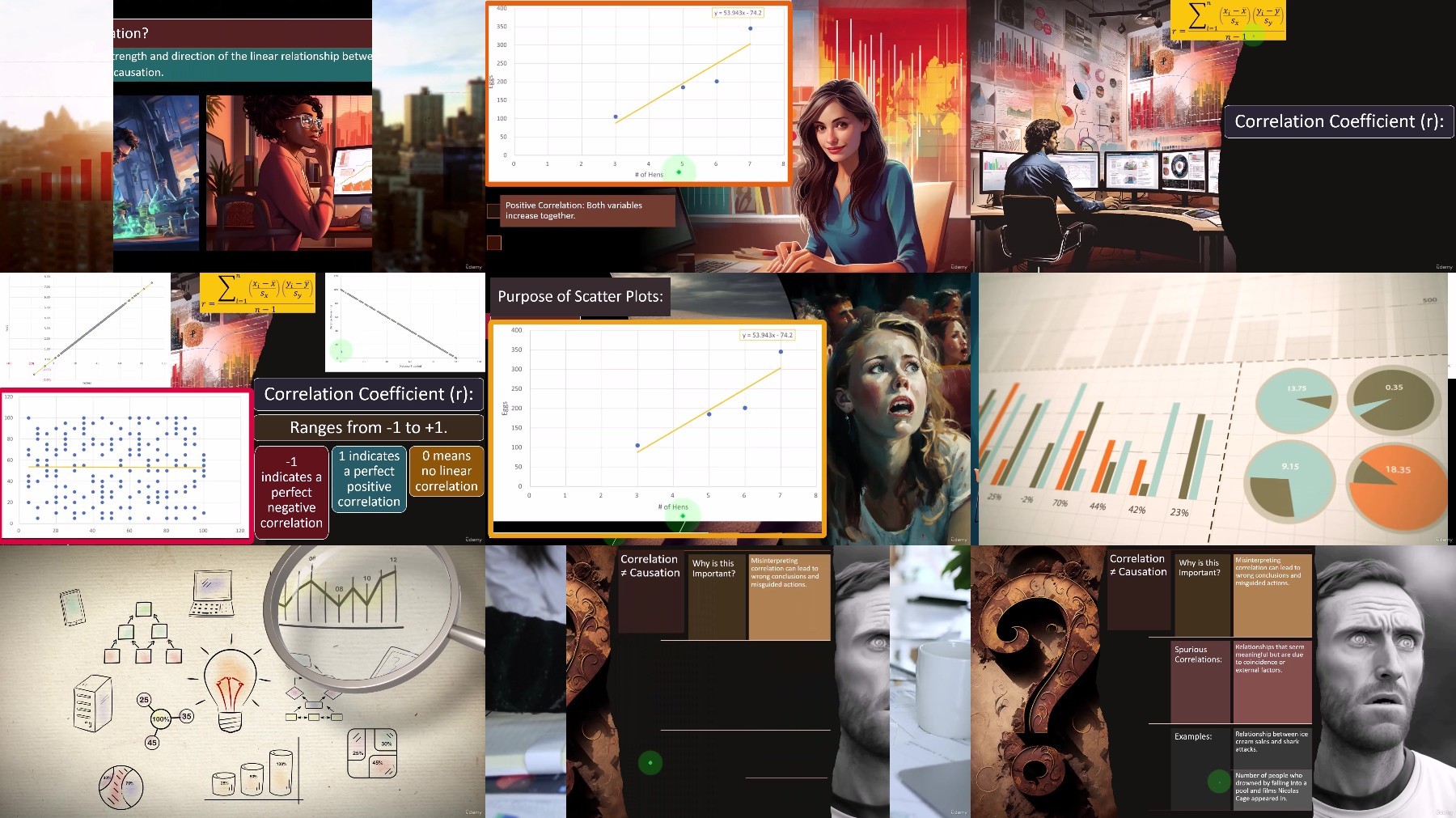Most Commented
Regressions & Correlation




Description material

Regressions & Correlation
Published 7/2024
MP4 | Video: h264, 1920x1080 | Audio: AAC, 44.1 KHz
Language: English | Size: 2.86 GB | Duration: 2h 37m
Unraveling Statistical Relationships: Mastering Correlation and Regression Analysis
What you'll learn
Understand the fundamental concepts of correlation and regression in statistical analysis.
Identify different types of correlations and their implications in various datasets.
Calculate the Correlation Coefficient (r) to quantify the strength and direction of linear relationships.
Create scatter plots to visualize data relationships and identify linear patterns.
Interpret scatter plots to determine the presence or absence of correlation.
Apply the principles of Simple Linear Regression to model the relationship between two variables.
Analyze residuals and employ the Least Squares Method to minimize them.
Evaluate the distinction between correlation and causation, recognizing spurious correlations.
Illustrate examples of statistical relationships using real-world data scenarios.
Critique misinterpretations of data relationships, emphasizing the importance of accurate analysis.
Requirements
Basic Mathematical Skills: A foundational understanding of basic arithmetic, algebra, and mathematical concepts.
Introduction to Statistics: Prior exposure to basic statistical concepts such as mean, median, mode, and standard deviation.
Computer Literacy: Proficiency in using a computer for basic tasks, including file management and internet navigation.
Data Handling Skills: Familiarity with data entry, manipulation, and basic spreadsheet functions (though no specific software, like Excel, will be required).
Analytical Thinking: An aptitude for logical reasoning and problem-solving.
Description
Welcome to this statistics course where we unravel the complexities of statistical relationships and predictive modeling. This course is meticulously designed for those who aspire to gain a profound understanding of correlation, regression, and the vital role they play in data analysis.We start our journey by dissecting the concept of correlation, exploring its types and implications, and emphasizing that correlation does not imply causation. Through illustrative examples like the relationship between height and weight, and ice cream sales with temperature, we make these concepts tangible. We will calculate the Correlation Coefficient (r), helping us quantify the strength and direction of linear relationships.Delving deeper, we introduce scatter plots, a pivotal tool in visualizing data relationships. Participants will learn to create and interpret scatter plots, identifying linear patterns and understanding when there might be no correlation at all. This visual prowess sets the stage for our next big topic: regression.Why use regression? This course answers the question by guiding students through the principles of Simple Linear Regression, modeling the relationship between two variables. We explore the concept of residuals, emphasizing the goal of minimizing these values through the Least Squares Method.However, we don't stop at just building models. The course instills a critical understanding of why "Correlation ≠ Causation," exploring spurious correlations and highlighting the importance of not misinterpreting data relationships. Engaging examples ensure that these lessons are not just learned, but also applied.By the end of this course, students will not only master the concepts of correlation and regression but also excel in utilizing these techniques for statistical analysis and predictive modeling. Join us to embark on this enlightening journey and transform your understanding of data relationships and the art of prediction.
Overview
Section 1: Introduction
Lecture 1 1710 Correlation and Regression
Section 2: OneNote Practice Problems
Lecture 2 OneNote Recourse
Lecture 3 1711 Perfect Positive Correlation
Lecture 4 1719 Perfect Negative Correlation
Lecture 5 1726 Correlation Simple Low Data Points Example
Lecture 6 1731 Correlation Random Number Generation Example
Lecture 7 1741 Correlation Calculation with Strange Result
Lecture 8 1751 Correlation Large Data Sets Focus of Z Score Relationship
Lecture 9 1761 Correlation Baseball Statistics
Data Analysts: Professionals who analyze data and need a stronger grasp of correlation and regression techniques to enhance their analyses.,Business Professionals: Individuals in business roles such as marketing, finance, and operations who use data to inform decision-making and strategy.,Students: Learners in higher education pursuing degrees in fields such as data science, economics, psychology, sociology, and other disciplines where data analysis is essential.,Anyone Interested in Data Analysis: Individuals with a curiosity about data and its applications, seeking to acquire practical skills in understanding and interpreting statistical relationships.

https://rapidgator.net/file/c3a50caa397188800b9a4627f3d303ba/Regressions.Correlation.part1.rar
https://rapidgator.net/file/e11eb946d5d27f548961db0d1540aacd/Regressions.Correlation.part2.rar

https://filestore.me/tg2tdg7abrzn/Regressions.Correlation.part1.rar
https://filestore.me/4vct9yfr22z8/Regressions.Correlation.part2.rar
What you'll learn
Understand the fundamental concepts of correlation and regression in statistical analysis.
Identify different types of correlations and their implications in various datasets.
Calculate the Correlation Coefficient (r) to quantify the strength and direction of linear relationships.
Create scatter plots to visualize data relationships and identify linear patterns.
Interpret scatter plots to determine the presence or absence of correlation.
Apply the principles of Simple Linear Regression to model the relationship between two variables.
Analyze residuals and employ the Least Squares Method to minimize them.
Evaluate the distinction between correlation and causation, recognizing spurious correlations.
Illustrate examples of statistical relationships using real-world data scenarios.
Critique misinterpretations of data relationships, emphasizing the importance of accurate analysis.
Requirements
Basic Mathematical Skills: A foundational understanding of basic arithmetic, algebra, and mathematical concepts.
Introduction to Statistics: Prior exposure to basic statistical concepts such as mean, median, mode, and standard deviation.
Computer Literacy: Proficiency in using a computer for basic tasks, including file management and internet navigation.
Data Handling Skills: Familiarity with data entry, manipulation, and basic spreadsheet functions (though no specific software, like Excel, will be required).
Analytical Thinking: An aptitude for logical reasoning and problem-solving.
Description
Welcome to this statistics course where we unravel the complexities of statistical relationships and predictive modeling. This course is meticulously designed for those who aspire to gain a profound understanding of correlation, regression, and the vital role they play in data analysis.We start our journey by dissecting the concept of correlation, exploring its types and implications, and emphasizing that correlation does not imply causation. Through illustrative examples like the relationship between height and weight, and ice cream sales with temperature, we make these concepts tangible. We will calculate the Correlation Coefficient (r), helping us quantify the strength and direction of linear relationships.Delving deeper, we introduce scatter plots, a pivotal tool in visualizing data relationships. Participants will learn to create and interpret scatter plots, identifying linear patterns and understanding when there might be no correlation at all. This visual prowess sets the stage for our next big topic: regression.Why use regression? This course answers the question by guiding students through the principles of Simple Linear Regression, modeling the relationship between two variables. We explore the concept of residuals, emphasizing the goal of minimizing these values through the Least Squares Method.However, we don't stop at just building models. The course instills a critical understanding of why "Correlation ≠ Causation," exploring spurious correlations and highlighting the importance of not misinterpreting data relationships. Engaging examples ensure that these lessons are not just learned, but also applied.By the end of this course, students will not only master the concepts of correlation and regression but also excel in utilizing these techniques for statistical analysis and predictive modeling. Join us to embark on this enlightening journey and transform your understanding of data relationships and the art of prediction.
Overview
Section 1: Introduction
Lecture 1 1710 Correlation and Regression
Section 2: OneNote Practice Problems
Lecture 2 OneNote Recourse
Lecture 3 1711 Perfect Positive Correlation
Lecture 4 1719 Perfect Negative Correlation
Lecture 5 1726 Correlation Simple Low Data Points Example
Lecture 6 1731 Correlation Random Number Generation Example
Lecture 7 1741 Correlation Calculation with Strange Result
Lecture 8 1751 Correlation Large Data Sets Focus of Z Score Relationship
Lecture 9 1761 Correlation Baseball Statistics
Data Analysts: Professionals who analyze data and need a stronger grasp of correlation and regression techniques to enhance their analyses.,Business Professionals: Individuals in business roles such as marketing, finance, and operations who use data to inform decision-making and strategy.,Students: Learners in higher education pursuing degrees in fields such as data science, economics, psychology, sociology, and other disciplines where data analysis is essential.,Anyone Interested in Data Analysis: Individuals with a curiosity about data and its applications, seeking to acquire practical skills in understanding and interpreting statistical relationships.

https://rapidgator.net/file/c3a50caa397188800b9a4627f3d303ba/Regressions.Correlation.part1.rar
https://rapidgator.net/file/e11eb946d5d27f548961db0d1540aacd/Regressions.Correlation.part2.rar

https://filestore.me/tg2tdg7abrzn/Regressions.Correlation.part1.rar
https://filestore.me/4vct9yfr22z8/Regressions.Correlation.part2.rar
Join to our telegram Group
Information
Users of Guests are not allowed to comment this publication.
Users of Guests are not allowed to comment this publication.
Choose Site Language
Recommended news
Commented


![eM Client Pro 9.2.1735 Multilingual [Updated]](https://pikky.net/medium/wXgc.png)




![[PORTABLE] Windows Movie Maker 2022 9.9.9.5 (x64) Multilingual](https://i.postimg.cc/KjfVh9Dh/Windows-Movie-Maker.png)

![Movavi Video Editor 24.0.2.0 Multilingual [ Updated]](https://pikky.net/medium/qhrc.png)

